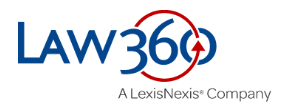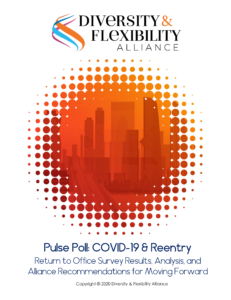Our Spotlight on Flex showcases professionals from member organizations who exemplify personal and professional success while working a flexible schedule. Their stories illustrate the long-term benefits that flexible schedules offer to both individuals and organizations.
July 2020 Spotlight on Flex
For July 2020, we are pleased to share insights from Samantha Lee, Partner, Wiley Rein (Washington, DC)
 Diversity & Flexibility Alliance: How have you made flexibility a priority and a success with your schedule?
Diversity & Flexibility Alliance: How have you made flexibility a priority and a success with your schedule?
Samantha Lee: I’m a Wiley Rein lifer; I summered at the firm and have been here ever since. I was pregnant with my son while I was a senior associate, and I assumed I’d return full time post leave as if nothing had changed. But after I had my son, I realized that coming back full time and pretending nothing had changed was definitely not going to work for me! Luckily, there are models of flexible work at the firm to look up to; I knew I needed to take a flexible approach with my return to work in order to maintain my mental health and my personal life, to be able to thrive in a high pressure position, balancing my commitment to client needs, and be active in firm citizenship.
I spoke to the firm’s Professional Development and HR teams to discuss my options – I didn’t know what flexible work would look like for me. The firm was supportive from the very first person I spoke with in both departments, and that support carried through to my practice group leaders (PGL). I was nervous about speaking with my PGLs because they play such a huge role in my professional development at the firm. But their immediate response was unhesitating support. They never questioned my need for flex; it was amazing and so incredibly reassuring that I was making the right choice for my career and for me.
Our nanny was also a grad student at the time, and she had to leave early on certain days for class. This allowed me to become comfortable with saying “no” because I also needed to be respectful of her schedule. The bottom line is that a flexible schedule gave me breathing room and provided the options I needed to come back to the firm after leave. Without it, I would not have stayed and been able to address some of the post-partum issues I was experiencing at the time too.
My original plan in 2017 was to come into the office every day and bill at 80% reduced hours for a year. But I stayed on this schedule for two years until I made partner in January 2020. It’s important to note that my choice to reduce my hours did not delay my path to partnership; I was promoted at the same time as my peers from my summer associate class. Once I became partner, and now that my son is older, I returned to a 100% billable hours schedule.
Even though I’m not on a formal flex schedule anymore, I still rely on flexible work in different ways. Wiley is a firm that recognizes people as people. If there comes a point where I can’t or don’t want to bill at 100%, I know the firm will support me. I know I can (and did) deliver the best quality service and work to my internal and external clients while working reduced hours. I openly share my flexible work experiences with everyone; people need to know they’re supported and shouldn’t feel stigmatized for wanting or needing to work flexibly. I understand why some people in less supportive firms feel the need for secrecy, but I don’t believe in this approach. The more people talk about working flexibly, the more mainstream it becomes.
DFA: How have the firm and/or clients contributed to your Flex Success®?
SL: I haven’t needed to address my schedule with clients; it’s just not something that comes up. I managed my reduced hours schedule by working on fewer matters, but I never gave less than 100% to every client. Because our group is so focused on building a talented and sustainable group, it’s easy to rely on a team and give younger associates the opportunity to learn and progress.
The firm has always given me what I needed; I have a great flex success story. I know the firm would support me again and any other attorney looking to incorporate a flex schedule in a heartbeat.
DFA: How has working flexibly made your career more sustainable and contributed to business/professional development opportunities?
SL: By reducing my annual billable target, I was able to focus on firm citizenship and business development opportunities that were important in my career. I was part of the recruiting committee, traveled for on campus interviews, and was able to take the time to speak to law students interested in working at Wiley Rein. Had I been billing at 100%, I would not have been able to do these things.
DFA: Looking back, would you do anything differently, or what would you tell your younger self?
SL: I would have spoken up sooner. Once I realized that flexible work was an option and what I needed, I waited too long to ask for it.
DFA: How do you recharge, and how do you pay it forward?
SL: Part of it’s maintaining a flexible schedule and the idea of being kind to yourself in all aspects. For me, that meant being OK with asking for childcare help one weekend a month so I could take time to recharge and focus on me. There’s nothing wrong with asking for help. My biggest responsibility is to be transparent, advocate on behalf of flexible work as a resource, and be an example of how it’s a viable option for career success. It can work for everyone.

 This article by
This article by  The poll was developed to uncover important data and trends related to the approach law firms and corporations are taking during this initial office re-opening phase and to provide advice on best practices. The poll’s questions were related to office re-opening task forces, guidelines regarding which employees could continue to work remotely once states re-open, and the types of resources and training provided to employees.
The poll was developed to uncover important data and trends related to the approach law firms and corporations are taking during this initial office re-opening phase and to provide advice on best practices. The poll’s questions were related to office re-opening task forces, guidelines regarding which employees could continue to work remotely once states re-open, and the types of resources and training provided to employees.